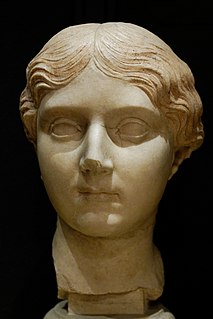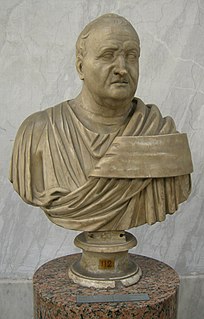Related Research Articles

Julia Agrippina, also referred to as Agrippina the Younger, was a Roman empress.

Nero was the fifth Roman emperor and the last emperor of the Julio-Claudian dynasty, reigning from AD 54 until his suicide in 68. He was adopted by the Roman emperor Claudius at the age of 13 and succeeded him to the throne. Nero seems to have been popular with the members of his Praetorian Guard, and with lower-class commoners in Rome and the provinces, but was deeply resented by the Roman aristocracy. Most contemporary sources describe him as tyrannical, self-indulgent and debauched. After being declared a public enemy by the Roman Senate, he committed suicide aged 30.

Antonia the Elder was a niece of the first Roman emperor Augustus, being the eldest daughter of Octavia the Younger and her second husband the Triumvir Mark Antony. She married Lucius Domitius Ahenobarbus and became the maternal grandmother of empress Messalina as well as paternal grandmother of the emperor Nero.

Tiberius Claudius Caesar Britannicus, usually called Britannicus, was the son of Roman emperor Claudius and his third wife Valeria Messalina. For a time he was considered his father's heir, but that changed after his mother's downfall in 48, when it was revealed she had engaged in a bigamous marriage without Claudius' knowledge. The next year, his father married Agrippina the Younger, Claudius' fourth and final marriage. Their marriage was followed by the adoption of Agrippina's son, Lucius Domitius, whose name became Nero as a result. His step-brother would later be married to Britannicus' sister Octavia, and soon eclipsed him as Claudius' heir. Following his father's death in October 54, Nero became emperor. The sudden death of Britannicus shortly before his fourteenth birthday is reported by all extant sources as being the result of poisoning on Nero's orders—as Claudius' natural son, he represented a threat to Nero's claim to the throne.

Gnaeus Domitius Corbulo was a popular Roman general, brother-in-law of the emperor Caligula and father-in-law of Domitian. The emperor Nero, highly fearful of Corbulo's reputation, ordered him to commit suicide, which the general carried out faithfully, exclaiming "Axios", meaning "I am worthy", and fell on his own sword.
Faustus Cornelius Sulla Felix was one of the lesser known figures of the Julio-Claudian dynasty of Ancient Rome.

Gnaeus Domitius Ahenobarbus was a member of the imperial Julio-Claudian dynasty of Ancient Rome. Domitius was the son of Antonia Major. He married Agrippina the Younger and became the father of the Emperor Nero.

Domitia was the oldest child of Antonia Major and Lucius Domitius Ahenobarbus, and the oldest granddaughter to triumvir Mark Antony by Octavia Minor, a great-niece of the Roman Emperor Augustus, second cousin and sister-in-law to the Emperor Caligula, first cousin to the Emperor Claudius, maternal aunt to the Empress Valeria Messalina, and paternal aunt to Emperor Nero.

Lucius Domitius Ahenobarbus was the son of consul Gnaeus Domitius Ahenobarbus and Aemilia Lepida. His mother was a paternal relative of the triumvir Marcus Aemilius Lepidus. His paternal grandmother was Porcia. Ahenobarbus married Antonia Major and through his son with her he became the grandfather of emperor Nero.
Sporus was a young boy whom the Roman Emperor Nero allegedly favored, had castrated, and married.
After the emperor Nero committed suicide near the villa of his freedman Phaon in June of 68 AD, various Nero impostors appeared between the autumn of 69 AD and the reign of the emperor Domitian. Most scholars set the number of Nero impostors to two or three, although St. Augustine wrote of the popularity of the belief that Nero would return in his day, known as the Nero Redivivus legend. In addition to the three documented Pseudo-Neros, Suetonius refers to imperial edicts forged in the dead Nero's name that encouraged his followers and promised his imminent return to avenge himself on his enemies.
Pythagoras was a freedman of the Roman emperor Nero, who he allegedly married in a public ceremony in which the emperor took the role of bride.
Servius Cornelius Scipio Salvidienus Orfitus was a Roman senator, and consul ordinarius for the year 51, as the colleague of the emperor Claudius. His father Orfitus was one of the seven sons of Vistilia, a noblewoman who came from a family that had held the praetorship, although some have erroneously stated Servius himself was the husband of Vistilia. He became a member of the gens Cornelia through adoption by an otherwise unknown Servius Cornelius Scipio.
Neophytus was a freedman of the Roman emperor Nero. He was one of the four companions on the emperor's late journey in June 68, with Epaphroditus, Phaon and Sporus, and was with him at his death.
The gens Domitia was a plebeian family at ancient Rome. The first of the gens to achieve prominence was Gnaeus Domitius Calvinus, consul in 332 BC. His son, Gnaeus Domitius Calvinus Maximus, was consul in 283, and the first plebeian censor. The family produced several distinguished generals, and towards the end of the Republic, the Domitii were looked upon as one of the most illustrious gentes.
Phaon is a boatman from Greek mythology, lover of Sappho.
Patrobius was a prominent freedman in the time of ancient Roman Emperor Nero. He and Helius exercised great and pernicious power and influence under Nero. In 66 AD he put on a luxurious show at Puteoli to honor the Armenian king Tiridates. Patrobius was executed along with several other of Nero's favorites after Galba came to power. They were marched in chains around the city before they were publicly executed.
The gens Paccia, occasionally written Pactia, was a minor plebeian family at ancient Rome. Only a few members of this gens achieved distinction in the Roman state, of whom the most illustrious was Gaius Paccius Africanus, consul in AD 67.
Titus Curtilius Mancia was a Roman senator, who held several offices in the emperor's service during the middle of the first century. He was suffect consul in the nundinium of November to December 55 as the colleague of Gnaeus Cornelius Lentulus Gaetulicus. No other senator with his gentilicium is known, so Mancia seems to have been a homo novus.
References
- 1 2 3 Weaver, Paul (2005). "Phaon, Freedman of Nero". Zeitschrift für Papyrologie und Epigraphik . 151: 243–252. ISSN 0084-5388. JSTOR 20191993.
- ↑ Champlin, Edward (2005). Nero. Harvard University Press. p. 5. ISBN 978-0-674-01822-8.